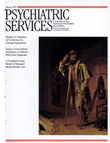Characteristics and service use of long-term members of self-help agencies for mental health clients
Abstract
OBJECTIVE: This study examined the characteristics of long-term members of self-help agencies managed and staffed by mental health clients, why they sought help from the agencies, and how they differed from clients of community mental health agencies. METHODS: A survey and assessment instruments were used to obtain information on the service utilization of 310 long-term agency members as well as on their resources, history of disability, functional status, psychological disability, health problems, and DSM-III-R diagnosis. Data from management information systems of the self-help and community mental health agencies were used to compare service populations. RESULTS: The self-help agencies served a primarily African-American population (64 percent), many of whom were homeless (46 percent). Eighty-seven percent had confirmed DSM-III-R diagnoses, and 50 percent had dual diagnoses with moderate to severe substance or alcohol abuse or dependence. They had sought help from the self-help agencies primarily for resources such as food or clothing, for "a place to be," or because they were homeless. Obtaining counseling or help for substance or alcohol abuse was a less important reason for coming to the self-help agencies. CONCLUSIONS: A high proportion of the persons served by the self-help agencies in the study were homeless and had a dual diagnosis of mental disorder and substance abuse. The self-help agencies provided their clients with material resources while community mental health agencies provided psychotherapeutic and medical care.
Access content
To read the fulltext, please use one of the options below to sign in or purchase access.- Personal login
- Institutional Login
- Sign in via OpenAthens
- Register for access
-
Please login/register if you wish to pair your device and check access availability.
Not a subscriber?
PsychiatryOnline subscription options offer access to the DSM-5 library, books, journals, CME, and patient resources. This all-in-one virtual library provides psychiatrists and mental health professionals with key resources for diagnosis, treatment, research, and professional development.
Need more help? PsychiatryOnline Customer Service may be reached by emailing [email protected] or by calling 800-368-5777 (in the U.S.) or 703-907-7322 (outside the U.S.).



